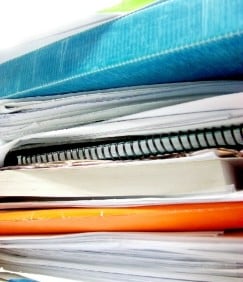 “What do I do with all my notes?” That’s a common question I get from clients when I coach and consult with them on their productivity at work.
“What do I do with all my notes?” That’s a common question I get from clients when I coach and consult with them on their productivity at work.
How to use pads of paper, Post-it Notes®, and Planners can be perplexing and what to do with scribbled notes, meeting notes and conference notes can be puzzling.
In addition to discussing the notes themselves, I always ask about the reason for the notes in the first place, so when it comes to your notes, think about why you’re taking your notes and how they will be useful to you later.
Here are 5 quick tips for taking notes and processing them so you can eliminate the clutter caused by endless note-taking:
1. Cut Back: Use a small pad for phone call notes so it doesn’t take long to fill up a page. Process the information quickly and tear off the page when you’re finished. Use a letter-size legal pad for meeting notes and conferences, although if you need help remembering to take fewer notes, use a smaller pad!
2. Separate and allocate: Take notes on separate pages if they’re for different clients, meetings, topics or purposes. This will allow you to separate your notes easily by tearing off the pages and filing them in different files.
3. Do it now: The first and best step after taking any notes is to review them immediately and do something with them. After you get off the phone or return from a meeting, look at your notes and get the information to its next station or location: your contact system, your calendar, your task list, or in a reference file. Make sure everything goes where it needs to go so you can either cross it out, toss it out, or tear off the page and file it, leaving the pad ready for the next call or meeting.
4. Remember quality, not quantity: When attending a meeting or a conference, think about your role in the meeting, your purpose for going to the conference and what you need to take away from these various types of gatherings. First, take fewer notes. The more notes you take, the more pages you need to keep and the more you have to manage later. So think quality, not quantity.
5. Keep the light bulbs: Sometimes notes hold great ideas, so make sure you have a file set up for each category of ideas, either physically or electronically. For instance, Marketing Ideas, Sales Tips, Business Development Ideas, Writing, Advertising or any type of idea you commonly have and want to keep track of.
You shouldn’t have to remember where the idea came from or when you heard or read it in order to find it. Simplify. All you need to know is that any great idea for marketing is captured in one file called “Marketing Ideas” and when you’re ready for them, you’ll know exactly where to look.
So the next time you review previously written notes or you’re about to take notes, remember you have to do something with your notes afterwards. Remember to ask yourself the all-important question: Will I actually need this information later? If not, you know what to do!
By: Leslie Shreve, MyCity4Her Enterprise Expert
Leslie Shreve is a productivity expert, founder of Productive Day and the creator of Taskology™ The Science of Getting Things Done. Since 2003, Leslie has been teaching business owners, executives and motivated professionals how to get more clarity and control in their work day so they can enjoy more time, freedom, focus and success. For more information or to get started on the road to peak productivity, visit www.productiveday.com or e-mail leslie@productiveday.com today.

